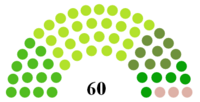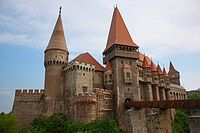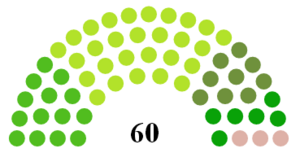Council of Counts of Barrayar
The Council of Counts in the Barrayaran Empire, formally the Honourable the Counts of the Empire of Barrayar in Parliament assembled, is the upper house of the Barrayaran legislature and the main legislative body of the State, the secondary one being the Emperor alone. The Council of Counts headquarters is located in central Vorbarr Sultana, at Castel Vorhartung, Vorbarr Sultana, a few yards from Star Bridge. Its members are the District Counts or their delegates, who meet bi-monthly.
The Council of Counts is composed of hereditary Counts (and their immediate heirs when exercising Counts' Voice), each of whom represents and rules a single Count District in its entirety, with each Count District being equally represented and ruled by a Count; with 60 Count Districts, there are 60 Counts.
As the upper house, the Council of Counts has several powers of advice which are unique to it; these include the advice to the ratification of treaties and the termination of senior judges, some officials, ambassadors, Imperial Auditors (in conjunction with the Council of Ministers) and other officers. It further has the responsibility of conducting trials of Counts and their families. The Council of Counts is the ultimate debating body on Barrayar. Comprised of hereditary Counts (and their immediate heirs when exercising Counts' Voice), the Council of Counts is the primary law-making body, with a secondary role in conducting trials of its' members for any and all criminal and honour charges brought against them – unless they decline to hear such charges, in which case the lower court system is used.
The presiding officer of the Council of Counts is the Lord Steward and President of Session of the Counts. In the Lord Steward and President of Session of the Counts's absence of guidance (i.e. almost always), the Lord Guardian of the Circle presides over the Council of Counts. The Council of Counts voting order is strictly alphabetical.
The legislative power of the Empure rests with a handful of rich Counts. In modern days, seven-to-eight powerful Counts control a large share of seats in the Council of the Little People. Of the 438 seats in the Council of the Little People, about half are controlled by High Vors, also beyond the share reserved to the Lesser Vors. In most cases, the eldest son of a Count stands for Council of the Little People.
Membership
Ordinary members of the Council of Counts are the ruling hereditary Counts of the Northern Districts of Barrayar. A Count must be at least 20 years old and must not be "lunatics": there is no upper age limitation. If a Count is under age, his Guardian sits in his stead at the Council of Counts (and rules his District); if he is found by the Council of Counts to be be a "lunatic", and his heir has already been confirmed by the Council as Heir Apparent, the ruling Count may be stripped of his seat (although this requires a supermajority of 50 votes in two proposals and the Imperial Assent). The Council of Counts is the sole judge of a Count's qualifications.
Voting Deputies and Cadet Council Members
Because not all Counts have the sole duty to rule and govern their lands, but instead they can have other Imperial duties, they are not the only persons who can sit in the Council, being supported by Voting Deputies and by Cadet Council Members.
The official Voting Deputy is a very trusted person who is not a Count's Heir but is his appointee voting proxy and his official representative in the Count's District when the Count is in the capital city or wherever out of his land.
A Cadet Council Member of the Council is the Count's Heir who has been pre-approved in the Count's lifetime as his successor. The approved Heir will succeed his Count automatically and instantaneously. Heirs are always entitled to vote in Council if the Count is absent, and act as authorized Voting Deputy if delegated to do so. So all Cadet Members are Count's Heirs (and authorized voting deputies), but not all Count's heirs are yet, necessarily, cadet members.
Legislative functions
Legislation may be introduced in either House but most often in the Council of Counts. The Council of Counts debates legislation, and has power to amend or reject bills. One of the most important functions of the Council of Counts is to approve money and levy taxes. Without money the Imperium cannot pursue its policies and so this is one of the major checks on Imperial power, alongside passing or dismissing laws, decrees and legislative decrees. The Council of Counts maintains the absolute power to reject a bill relating to revenue or supply.
Most powers lie with the Council of Counts. All bills except money bills are debated and voted upon in the Council of the Little People; however by voting against a bill, the Council of the Little People can only delay it for a maximum of a year. After this time, the Council of Counts can force the bill through without the Litte People's consent. Bills supported by the monarch are often proposed by members of the Privy Council who sits in parliament or directly by the Emperor, who sits in the Council of Counts as Count Vorbarra.. Hence, the Council of Counts is clearly the most powerful branch of Parliament.
Advice functions
Customs and traditions provide several unique functions for the Council of Counts that form its ability to "advice the exercise of the powers" of the Emperor of Barrayar. These include the requirement that the Council of Counts may advise and contest to some of the Emperor's government appointments; also the Council of Counts must not oppose to all treaties with foreign governments.
The Council of Counts also has other special powers:
- Hearing annual reports from the Government of the Empire on the results of its work, including on issues raised by the Council;
- Appointment and dismissal of the Chairman of the Central Bank of Barrayar;
- Dismissal (alone) of some officials appointed by the Council of Ministers;
- Announcement of Amnesty;
- Controlling its own membership by approval or dismissal of Counts' Heirs Apparent;
- Judging Counts and their Heirs: the Council of Counts is a body that is highly intolerant of Imperial intervention in a Count's District or against Count's own life.
Acts of Treason
An Act of Treason and Subsequent Punishment is the act of a the Council of Counts fully assembled declaring a person or group of persons (in practice mainly Vors, although no restriction is set) guilty of some crime and punishing them without privilege of a judicial trial. The effect of such an Act is to nullify the targeted person's rights: the right to own property (and thus pass it on to heirs), the right to any position of authority, and the right to life itself. The use of these acts is very rare, by being potentially very dangerous for those who pass it themselves: every usage of such an act strengthens the possibility that a similar act will be passed in future.
Acts of Treason must be voted by the Council of Counts in a plenary session; if the target is a Count, he is permitted to be present at the Session under a safe-conduct, although he is not entitled to vote. The Quorum needed is 45 if there are up to 15 Counts targeted; if there are more than 15 Counts targeted, the Quorum falls to the absolute majority (i.e. 31). The Act of Treason can be presented to the Council of Counts only by the Emperor, or by the Regent.
Trials by Council of Counts
While plebeians and Low Vors do not have a right to trial by a jury of their equals (other commoners), Counts, their spouses and their Heirs have the right to trial by other Counts. No Count can be brought in judgement to lose his goods, lands, tenements and castles, nor to be arrested, imprisoned, outlawed, exiled, nor judged, nor put to answer, nor be judged, but by award of the Council of Counts.
The entire Council of Counts determines both questions of fact and questions of law as well as the verdict. At the end of the trial, peers vote on the question before them by standing and declaring their verdict, proceeding in alphabetical order. For a guilty verdict, a majority of 31 is necessary. The entire Council of Counts also determines the punishment to be imposed, which has to accord with the law. If a Count is convicted of a crime, except treason or murder, he could claim "privilege of Countship" to escape punishment if it is his first offence.
Committees
The Council of Counts also has a series of committees. They submit their findings and reports to the various Ministers, the Council itself and the Emperor.
- General and Institutional Affairs (GIA);
- General Economic Affairs (GEA);
- Agriculture and Fisheries (Agrifish);
- Justice and Internal Security (JIS);
- Defence and External Affairs (DEA);
- Labour, Welfare, Health and Consumer Affairs (LAWEHCA);
- Industry and Research (Indure);
- Transport, Telecommunications and Energy (TTE);
- Environment (ENV);
- Education, Youth, Culture and Sport (EYC).
Political structure
While during most of Gregor Vorbarra's reign the Council of Counts was divided into a Progressive Party and a more traditional-minded Conservative Party, currently it is politically fragmented. Conservatives and Progressives still exist, but they are only two among other factions, and they are not the largest ones. Nowadays, it mainly exist a big centre-right faction, which calls itself "Loyalist" (consisting of hard-liner supporters of Emperor Serg Vorbarra). These centre-right loyalists are flanked a centrist "Moderate" faction and an hard-liner traditionalist faction, the "Conservatives" themselves. There are also Progressives and Technocrats.
Lord Guardian of the Circle
The Lord Guardian of The Circle is the most important official of the Council of Counts as well as a political position, whose job duties included maintaining order within the Council of Counts during sessions and meetings. Primarily, he makes sure the correct person speaks at the correct time. To get peoples' attention, he has a cavalry lance decorated with Vorbarra colours, that he bangs on the wooden panel on the floor. The Lord Guardian is not a Count and therefore does not cast his vote during voting moments, but he has a powerful position, because he regulates discussion during meetings of the Council.
The Lord Guardian of the Circle is also responsible for maintaining the building of Vorhartung Castle, as well as services and security. Lord Guardian's official duties also include responsibility as the personal attendant of the Emperor and Keeper of the Doors of the Council, in charge of the admission of strangers to the Council of Counts. Either the Lord Guardian or his deputy, the Gentleman Usher, is required to be present when the Council of Counts is in session. The Lord Guardian also keeps out any Count or Deputy guilty of excessive contempt or disorder.
The Lord Guardian is formally appointed by the Crown based on a recruitment search performed by the Clerk of the Parliaments, to whom he reports. The office is usually held by retired senior Vor officers. His deputy is the Gentleman Usher of the Circle, who in turn is assisted by the Yeomen of the Circle. The Lord Guardian is the chief bureaucrat of the Council of Counts, in effect acting as the primary administrator of the body itself. Though not a member of the Council, the Lord Guardian is nonetheless a powerful and influential position due to the access to the top-levels of leadership it provides.
Lord Steward and President of Session of the Counts
The Lord Steward and President of Session of the Counts is the speaker and chairman of the Council of Counts in the Parliament of Barrayar. The Lord Steward and President of Session of the Counts is elected by the Counts for life, and he is expected to be politically impartial in carrying out positional duties.
The main functions of the Lord Steward and President of Session of the Counts are to take the chair in debates held in the chamber of the Council of Counts, to advise the Counts on procedural rules, to speak for the Counts on certain ceremonial occasions, and to represent the Council of Counts as its ambassador. In practice, the only task of the Lord Steward and President of Session of the Counts in the Chamber is to formally put the question before a vote, to announce the result of any vote, and to make certain announcements. Furthermore, the Lord Steward and President of Session of the Counts may end the adjournment of the Council during a public emergency.
Clerk of the Council
The Clerk of the Council is the chief clerk of the Council of Counts. Duties include preparing the minutes of Counts proceedings, advising on proper procedure and pronouncing the Imperial Assent.
The Clerk of the Council is appointed by letters patent from the Emperor, who also holds the sole power to remove him. The Clerk has a variety of tasks within the Council. Appointees are usually legal profession figures, such as retired high rank judges. He is assisted by two other clerks - the Clerk Assistant and the Reading Clerk. The Clerk of the Council sits in the Chamber during sittings, and calls on items of business. At the start of a sitting all three Clerks are normally present.
As well as providing advice on procedure, the Clerk also prepares the minutes of proceedings in the Counts, signs all official documents and communications and pronounces the Imperial Assent. The Clerk also supervises several offices, including his own Clerk of the Council's Office, Lord Guardian's Department and the Judicial Office, which advises and assists the Counts during trials.
Counts' formal robes
Counts have special robes that are worn at coronations and during certain special parliamentary occasions, such as the Regent Designation or a Trial by Treason. The robes have special designs based on the house of the Count. Formal robes of Counts include scarlet velvet cloaks extending to the feet, open in the front and trailing behind. The robes also include a hood and a cape of miniver.
Robes are only worn for some occasions: Coronation, Designation of Regent, Trials by Treason, the giving of the imperial assent, and for the introduction of new Heirs or Counts. The Formal Robe is a full-length robe of finely-woven crimson wool cloth, and is in the form of a mantle opening on the right shoulder, with a collar of white miniver fur, guarded with rows of ermine and gold lace round the right shoulder. They are lined with silver silk. The side seams of the robe are closed.
The robe is worn over red-and-blue parade uniform by Counts forming part of a procession with His Majesty on state occasions. On ordinary occasions, such as for the introduction of new Heirs or Counts, it is worn over morning dress or house uniform.


